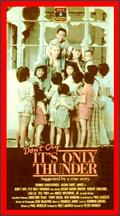| This article needs additional citations for verification. Please help improve this article by adding citations to reliable sources. Unsourced material may be challenged and removed. Find sources: "Don't Cry, It's Only Thunder" – news · newspapers · books · scholar · JSTOR (February 2013) (Learn how and when to remove this message) |
| Don't Cry, It's Only Thunder | |
|---|---|
 | |
| Directed by | Peter Werner |
| Written by | Paul G. Hensler |
| Produced by | Walt deFaria Paul G. Hensler Ken Karawai Terry Ogisu Shintaro Tsuji |
| Starring | Dennis Christopher Susan Saint James Roger Aaron Brown James Whitmore Jr. |
| Cinematography | Donald McAlpine |
| Edited by | Barbara Pokras Jack Woods |
| Music by | Maurice Jarre |
| Distributed by | Sanrio |
| Release date |
|
| Running time | 108 minutes |
| Country | United States |
| Language | English |
Don't Cry, It's Only Thunder (also known in Australia as Vietnam: Hell or Glory) is a 1982 American war drama film directed by Peter Werner and written by Paul G. Hensler, set in the Vietnam War.
Synopsis
The story centers around Brian Anderson (played by actor Dennis Christopher), a U.S. Army soldier serving in South Vietnam, who is only out for his own neck, who ends up drawn into taking care of orphans in a nearby orphanage, keeping a promise to a friend who was killed in action. At first, he views the task with a degree of annoyance, then slowly begins to warm up to the orphans, risking his life and his career to protect them. Robert Englund (pre-dating his more-well-known role of Freddy Krueger) played the role of Tripper. Susan Saint James played a doctor and the love interest to Brian Anderson.
Background and reception
Paul G. Hensler, the film's screenwriter, was a Vietnam veteran who wanted a film that showed both the "humanitarians" among Americans sent to Vietnam as well as the victims and corruption in war. Although the film portrayed military corruption and the war's victims, the Defense Department supported it. The Army was reported as mixed to positive about the film. Despite the film's mixed view of the military, and its intended criticism of war, the military approved of the main character being a person who matured due to the war, becoming a person who loved and tried to save orphans. The writer indicated he did not mean to show war as necessary for his maturing, indicating that the Peace Corps or something else would be as good or better. Still, the maturing of the character and showing a humanitarian side to Americans in Vietnam pleased the military, which at that time was dealing with films on Vietnam focusing on soldiers who were destructive or even nightmarish people.
The film was shot in the Philippines.
It was criticized for sentimentality, but overall received good critical reviews. Nevertheless, it was a commercial failure. This has been blamed on its relatively poor production values and its reportedly having a complicated, rather than simply positive or negative, view of the war.
References
- "Don't Cry, It's Only Thunder (1982)". American Film Institute. Retrieved 26 September 2020.
- Guts & Glory: The Making of the American Military Image in Film by Lawrence H. Suid, pgs 464-467
External links
| Films directed by Peter Werner | |
|---|---|
|
This article about a war drama film is a stub. You can help Misplaced Pages by expanding it. |
- 1982 films
- Vietnam War films
- 1982 independent films
- 1980s war drama films
- American independent films
- American war drama films
- Films directed by Peter Werner
- Films scored by Maurice Jarre
- Films shot in the Philippines
- 1982 drama films
- 1980s English-language films
- 1980s American films
- English-language independent films
- English-language war drama films
- War drama film stubs